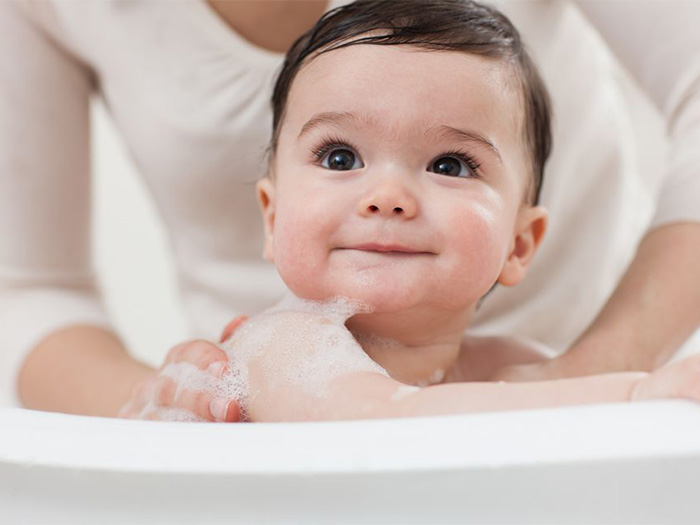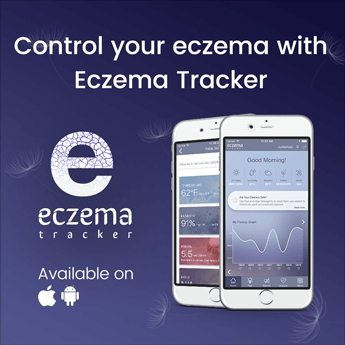Overview:
There are many homemade eczema baby wash products in the market to soothe your baby’s skin and every parent dealing with eczema is in search of the best eczema skin care product for their little one. If it’s baby body wash, shampoo or moisturizer, you choose the best brand to ensure the baby’s skin and scalp remain soft and supple. However, several commercial eczema products for babies available in the market today are formulated using toxic chemicals that are harsh on your infant’s skin and can even lead to serious health issues.
A baby’s skin is more sensitive and delicate than ours, hence, demands more care. Also, their skin is new and soft, absorbs anything applied to it more quickly than ours. You must carefully select the product that comes in direct contact with the newborn’s skin as their dermis is more vulnerable and prone to irritation and rashes.
It may be time-consuming and confusing to select an appropriate personal eczema care products for babies as a huge percentage of conventional products contain ingredients that can cause irritation, rashes, teary eyes, diaper rashes and more.
Your baby’s skin becomes more sensitive and susceptible to irritation, if they develop eczema during the initial years of their life. The chronic skin condition makes it more essential to adopt the right course of daily care regime. Eczema is not curable but it can be controlled through proper moisturization, use of suitable skin care products and medication. It is necessary that you choose correct baby wash, shampoo or lotion to avoid eczema flare-ups in your child.
Causes Of Eczema in Babies

About 10% to 20% of the infants are affected by eczema in the US. While most of the babies outgrow their condition as they reach adulthood or even before, some may continue to experience the symptoms on and off throughout their life. The skin ailment can be controlled with proper course of treatment and medical advice.
Eczema more commonly develops during the first two years of life, specifically when the baby is three to six months old. A few children may develop the skin condition later, however, it is rare to find children affected by the ailment after the age of five years.
The initial symptom of eczema in babies can be a rash on their scalp (sometimes called “cradle cap“) but it doesn’t certainly signify that the child will develop eczema. Other symptoms include dry, itchy, scaly skin patches that may become red or weep due to excessive scratching of the affected area.
The age at which the child develops eczema determines their course of the disease. Babies that develop this condition before the age of twelve months are able to outgrow of it quickly; only 50% are suspected to have eczema even after three years. However, children who develop eczema between the age of two and five years are often affected by the condition for a longer period. It is estimated that eczema goes away within ten years in more than 80% of all affected children, and within 20 years in up to 95%.
Eczema symptoms may reappear during adulthood, especially on the hands. It is very uncommon for people to develop this skin disease in adulthood but if they do, it is usually chronic.
Ingredients to Avoid in Baby Products –

You might be extra cautious and must even be reading the label well before purchasing a baby product. However, you must specifically check for certain ingredients that are hazardous to the baby’s skin. Baby shampoo and body wash are often formulated with surfactants to foam and cleanse, preservatives to provide a long shelf life and fragrances to make them smell nice, pleasant. These surfactants, preservatives and fragrances are usually toxic chemicals that must be avoided for healthy baby skin.
Further discussed are few more commonly used ingredients that are detrimental for the baby’s skin.
1. Fragrance
Your baby shampoo or body wash might smell nice but this pleasant, sweet smell is nothing more than a synthetic fragrance that causes irritation. Fragrances in cosmetic and personal care products have been associated with allergies, skin irritation and eczema and can also be harmful to various body organs.
If you find any product label that lists fragrance, perfume or parfum, immediately put it back to the shelf.
2. Phthalates and parabens
Phthalates and parabens are a group of chemicals that are used as preservatives in personal care products like baby shampoos and lotions. Parabens were primarily used to inhibit the growth of any kind of microbes in water-based products. However, the compound has been known to disrupt hormone function that leads to an increased risk of breast cancer and reproductive problems. The baby’s endocrine system is in developing stage, usage of such chemicals can result in significant damage.
Why You Should Avoid Parabens can be found as any of the following ingredients: Ethylparaben, butylparaben, methylparaben, propylparaben, other ingredients ending in –paraben.
3. Sodium Lauryl Sulfate (SLS)
SLS is commonly used as a surfactant and foaming agent in baby shampoo and body wash. It can be listed in the ingredients as sodium salt sulfuric acid, sulfuric acid, monododecyl ester, sodium salt, monododecyl ester sodium salt sulfuric acid, sodium dodecyl sulfate, aquarex me or aquarex methyl.
Sodium lauryl sulfate (SLS) can cause damage to the organs, neurotoxicity, endocrine disruption, reproductive concerns, irritation of the skin, eyes and cancer.
4. Propylene Glycol
Propylene glycol is a liquid alcohol that is more commonly used as a fragrance agent in baby products. You may find the ingredient listed in baby wipes, shampoos etc. it may not be present in high concentrations but can result in irritation and allergies. You must avoid this ingredient from your baby’s gentle, sensitive skin.
5. Formaldehyde
This toxic chemical is often linked to cancer, damage to the central nervous system and reproductive health. It is often used as a preservative in cosmetics. Often baby wipes, body wash and shampoos contain formaldehyde or formaldehyde releasing chemicals as preservatives.
Formaldehyde releasing preservatives may include:
- Benzylhemiformal
- Tosylamide/Formaldehyde Resin
- 2-bromo-2-nitropropane-1,3-diol
- 5-bromo-5-nitro-1,3-dioxane
- Diazolidinyl urea
- Glyoxal
- 1,3-dimethylol-5,5-dimethylhydantoin (or DMDM hydantoin)
- Methenamine
- Imidazolidinyl urea
- Sodium hydroxymethylglycinate
- Quaternium-15
- DMDM Hydantoin
- Polyoxymethylene Urea
Safer Alternatives
Frequent washing and more use of cleansers, shampoos can absorb the natural moisture/oils from the baby’s sensitive skin and make it dry. The best way to protect your baby’s skin is to adopt certain homemade formulations for DIY baby body wash and shampoo. There are several websites that provide natural recipes adopted by mothers for their babies.
In This post we are sharing with you a simple and effective DIY Eczema Body Wash!!
1. Natural Homemade Baby Wash and Shampoo

Ingredients:
- 1.5 cups liquid unscented castile soap
- 4 tbsp vegetable glycerin
- 1-2 tsp almond oil, fractionated coconut oil or favorite carrier oil
- 1 tsp aloe vera juice (optional)
- 10 drops essential oil (I like to use Lavender or Gentle Baby)
- 1-2 tbsp filtered or distilled water
Instructions:
- In a 16 oz pump bottle, add castile soap, vegetable glycerin, carrier oil, essential oils and aloe vera juice.
- Top with distilled or filtered water.
- Replace lid securely and shake vigorously for a few seconds.
- Use as needed.
Source: https://dontmesswithmama.com/natural-homemade-baby-wash-and-shampoo/
2. DIY Eczema Body Wash – (Shampoo For Baby)

In a foaming dispenser, add the following ingredients:
- 1 oz. liquid castile soap (we use an unscented kind)
- 4 oz. filtered water
- 3 drops lavender essential oil (find 100% pure essential oils here)
- 3 drops orange essential oil (alternately, you can use 3 drops lemongrass and the combination will smell just like Fruit Loops)
Source:- https://www.diynatural.com/homemade-for-baby/
Note: The shared information is a result of our research. Our goal is to simply provide you with the data that can help you find what can be beneficial for your baby’s sensitive skin.
In addition to these natural alternatives, certain companies have launched organic products or special formulations that are friendly to the baby’s skin. You may check out for the following baby products to promote healthy skin:
- Elizabeth Parker’s baby shampoo: the shampoo includes natural ingredients like manuka honey, aloe vera, cehami and more. The formulation will help your child get rid of eczema, dry scalp, flaky skin and more.
- Cetaphil baby wash & Shampoo: this dermatologically tested product is a mixture of calendula and aloe vera extracts that helps nourish the baby’s skin.
Related Posts:





